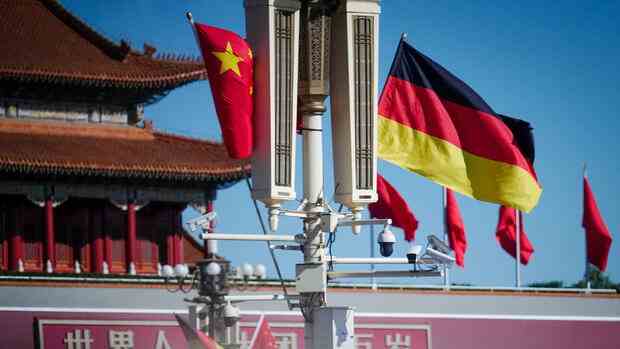China fears that Germany, its most important advocate in Europe, may turn away.
(Photo: dpa)
Berlin In the struggle over the German government’s new China strategy, the debate is becoming more and more intense. This week, the Asia-Pacific Committee published its position paper on the China strategy. The German Chamber of Commerce Abroad in Beijing (AHK) and the Association of German Plant and Mechanical Engineers (VDMA) had previously spoken with their own papers.
The tenor is always the same: diversification yes, decoupling no. In its position paper on the German government’s China strategy, the Asia-Pacific Committee calls for a “balanced” approach to China for German business. “It is important to reduce risks, but at the same time to enable partnership to leverage economic potential and cooperation on global challenges,” it says.
The authors warn that a diversification strategy cannot rely on a withdrawal from the Chinese market. “It is important to take advantage of the opportunities on the Chinese market and at the same time establish and expand new markets.”
The statement by the Chamber of Commerce Abroad in Beijing (AHK) sounds very similar. German companies are already strategically adapting to the changed situation, assessing the risks and strengthening the resilience of their China business and their supply chains through diversification and other measures, it says. “However, decoupling or turning away from China is neither sensible nor desirable.”
Top jobs of the day
Find the best jobs now and
be notified by email.
And the VDMA admits that China is now a “systemic competitor”, but that China is the second most important export market in the world for mechanical engineering and cannot be replaced in the short or medium term.
The wording shows how nervous the German economy is with regard to China. After all, no politician is actually calling for a complete departure from China. In the debate about the China strategy, the German government had always emphasized that it was about diversification, not decoupling.
China still offers growth potential
Because even if many companies are now reconsidering their involvement in China, many will remain heavily involved there for the foreseeable future – especially since there is still a lot of growth potential in many areas despite a significantly more difficult market. The German car industry in particular, but also the chemical company BASF, have invested billions of euros in the market in recent years.
One thing is clear: relations between China and Germany have changed, and the Chinese government fears that its most important advocate in Europe will become a critic.
At the beginning of the week, China’s embassy in Germany Wu Ken made serious allegations against the federal government: According to Wu Ken, the draft that has been published so far gives the impression that it is “mainly guided by ideology,” he told the Handelsblatt in an interview.
According to information from the Handelsblatt, representatives of China had already expressed their displeasure in talks with the German ministries. Politicians of the traffic light coalition defended themselves against the allegations.
>> Read here: Interview with China’s Ambassador Wu Ken – “Cold War mentality”
But even within the federal government, there is still disagreement about the strategy. The responsible Federal Foreign Office wants the strategy to contain concrete instructions for action. The background to this wish is that the federal states and sometimes the ministries have not always pulled together when it comes to China policy.
From the Federal Foreign Office’s point of view, this is a target for attack, especially with regard to the Chinese government, which has cleverly exploited this inconsistent action in the past. The Federal Chancellery, on the other hand, advocates a tighter paper.
China observers like Sebastian Heilmann, a professor at the University of Trier and founding director of the Berlin China think tank Merics, also advocate rougher lines. The draft that has become known so far (as of November) has around 60 pages. The federal government’s Indo-Pacific guidelines were also lavish in 2020 and comprised around 70 pages.
China strategy could quickly become obsolete
China professor Heilmann warns the Handelsblatt that the current status of the China strategy will be waste from day one. “Even in government without broad support; fuzzy and unclear in the priorities; driven by the reactive day-to-day business in the individual measures.”
>> Read here: China Strategy – How the Federal Government intends to reposition itself vis-à-vis Beijing
The strategy will not serve any practical purpose in the form pursued so far, but only trigger conflicts within the federal government – and possibly within the EU and with the USA; contradictory positions and areas of attack in the foreign policy discussion and offer China’s government fairly precise information on how best to overturn German or European China policy, says Heilmann.
As things stand at present, the debate about the China strategy will continue in the coming months. It is not to be completed until after the national security strategy, which is not expected until mid-February at the earliest.
More: This is the traffic light’s secret project list against China’s influence

